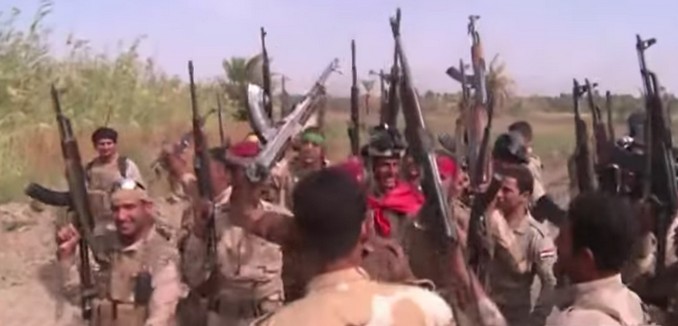The Associated Press (AP) reported Wednesday that photos appearing on Iraqi news sites showed that Iranian Revolutionary Guard Corps (IRGC) commander Maj. Gen. Qassem Suleimani was involved in a recent battle to drive the Islamic State of Iraq and Syria (ISIS) from the Iraqi city of Jurf al-Sakher. The AP also reports that local commanders acknowledge the involvement Hezbollah in the fighting.
That could prove a major impediment to addressing the grievances of Iraq’s Sunni minority. Iran and Hezbollah are closely linked with Iraqi Shiite militias, which have also played a key role in driving IS out of the so-called Baghdad Belt of Sunni villages ringing the capital. The sectarian militias have long been implicated in brutality against Sunnis, and their advance could undermine efforts to knit the troubled country together.
Militia commanders told The Associated Press that dozens of advisers from Hezbollah and the Iranian Revolutionary Guard were on the front lines in Jurf al-Sakher. They said the advisers provided weapons training to some 7,000 Iraqi troops and militia fighters and coordinated with military commanders ahead of the operation.
There are reports that Hezbollah and IRGC backed militias “have abducted and killed scores of Sunni civilians with the tacit support of the Iraqi government.” AP quoted a Iraqi Sunni legislator, Hamid al-Mutlaq, as saying, “This undeclared Iranian help harms national reconciliation and the sovereignty of Iraq.”
In June, noting Hezbollah leader Sheikh Hassan Nasrallah’s pledge to help Iraq, Matthew Levitt and Nadav Pollak of the Washington Institute for Near East Policy provided a history of the terror group’s activities in Iraq.
Beginning in 2003, Iran’s Qods Force requested Hezbollah’s services to help increase Tehran’s influence in Iraq. To this end, Hezbollah created Unit 3800, whose sole purpose was to support Iraqi Shiite militant groups targeting multinational forces there. According to U.S. intelligence, Unit 3800 sent a small number of personnel to Iraq to train hundreds of fighters in-country, while others were brought to Lebanon for more advanced training. Hezbollah also provided funds and weapons to Iraqi militias, but its most dangerous contribution was in the realm of special operations. According to a 2010 Pentagon report, the group gave these militias “the training, tactics and technology to conduct kidnappings [and] small unit tactical operations,” and to “employ sophisticated improvised explosive devices (IEDs), incorporating lessons learned from operations in Southern Lebanon.”
The most prominent example of how this training helped the militias was probably the January 20, 2007, attack on the Joint Coordination Center in Karbala, which resulted in the deaths of four American soldiers. That well-executed operation was thoroughly planned with the help of the Qods Force and Hezbollah, as determined later through the capture of one of Hezbollah’s best trainers in Iraq, Ali Musa Daqduq. Daqduq was heavily involved in training tactical units of Iraqi Shiites and even took part in some of the operations they conducted. He was also responsible for planning other operations such as the aborted kidnapping of a British soldier, and gave specific instructions to those he trained about the use of IEDs. Moreover, while operating in Iraq, he dealt directly with the Qods Force on certain occasions — further evidence of the high level of coordination between Hezbollah and the Iranians on Iraq.
Not only does the coordination between Hezbollah and Iran in Iraq show that Hezbollah is less “a parochial Lebanese political party” than the “the tip of an Iranian imperial spear,” but also demonstrates that both the terror organization and its sponsor are allied against the United States and American interests.
Last month Iranian media showed a picture of Suleimani reportedly in Iraq. According to recent reports in the Arabic media, Iran is also coordinating the activities of Shiite militias in Syria.
[Photo: PressTV News Videos / YouTube ]




